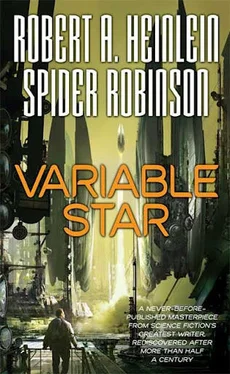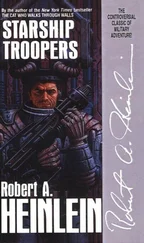I glanced down. There were three lights on the panel, now, all ruby red, all flashing.
And the third System twin, I recalled, had lived at the north pole of Ganymede, which could easily have been in the blast shadow of Jupiter. I found myself trying to picture what Jupiter must have looked like from behind as she was being destroyed by her bigger sister. The nature of the cataclysm must have been as unmistakable as it was inconceivable.
And the precise relative timing of the two telepathic reports would have nailed it down.
At that point it started to sink in that everyone I cared about who was not aboard this ship was dead. Friends, relatives, teachers, colleagues, acquaintances, people I’d always intended to look up one day—
The ruby lights were slightly out of synch. The rhythmic interplay was very interesting. It gave me an idea. I wished I had a sax with me. I looked up at Solomon, with the vague intention of asking him to fetch me one, and the moment I saw his face, the final punch arrived. The others had all been solid, bare-knuckled lefts, but this was the big right hand, square in the heart.
Jinny was dead.
Not “dead to me.” Not hypothetically dead, at some future time. Dead.
The moment I’d stepped aboard a relativistic starship without her, I had known and accepted that I would now probably outlive Jinny by many years. When I arrived at Brasil Novo, still just on the sunny side of forty, ninety years would have elapsed on Terra, and Jinny would be—
Absurdly, my brain actually did the math.
—ash, seventy-nine years cold—
If she had taken me up on my offer—my plea—and come aboard with me, to homestead in the stars… she’d have lived.
I discovered that Solomon was holding my head against his chest. I hadn’t even noticed him approach. I pulled back, found his eyes, and smiled broadly.
Doing Richie, I said, “I hate to say atojiso, Jinny, but I fuckin’ atojiso.”
But I couldn’t hear a word I was saying. Some asshole was playing a tenor too loud. Probably Philip Glass’s first piece: the same note endlessly repeated. Beep! Beep! Beep! Beep! Beep! I didn’t give a fucking fly how many measures he waited before he varied it, and I tried to ask Sol to durn it town. But Sol’s eyes were widening. Kept widening until they covered his whole face and met around the back. Pupils turned yellow, became big yolks, and not very funny ones, either. Felt him laying me back down in the autodoc. Splendid old James Raymond song. “Lay me down in the river, and wash my self away. Break me down like sand from a stone. Maybe I’ll be whole again one day.” Lay me down…
The lid of the autocoffin closed over me, and washed my self away.
We need to have as many baskets for our eggs as possible. Even if we don’t manage to ruin this planet ourselves, natural disasters or changes—or even changes in our star—could make it impossible to live on this planet.
—Philosopher Anson MacDonald, radio interview, Butler, MO, USA, Terra, July 7, 1987 (“Anson MacDonald Day”)
When I did emerge from the Infirmary, nothing had changed, and everything was different.
I had once read a book, a whole book, about what it was like to be in New York City during the week following the 2001 terrorist attack. So none of the things I saw surprised me. I’d just never expected to see them with my own eyes. Not everywhere I looked.
I suppose by definition there had never been a more emotionally traumatized bunch of people in history before. We were the first sons and daughters of Terra, grandchildren of Sol, who had ever literally lost everything but what we were carrying. Our ancestral womb was gone. All our home planets were gone. Our civilization was gone. Our star was gone.
There was no precedent for processing something like that. No appropriate ritual. No traditional therapy.
Not one human religion had ever even contemplated such a turn of events—not even the old, psychotically blood-thirsty ones we’d had to eliminate. It upstaged Ragnarok, dwarfed Armageddon, mocked Apocalypse, overshadowed the Qiyamah, outdid the Kali Yuga, ruined the prophecy of Maitreya Buddha.
The center of the universe appeared to be somewhere else . The possibility had occurred to hardly anyone, ever.
By the time my ’doc decanted me for the second time, forty-seven of my fellow colonists had committed suicide, by an assortment of means.
That there were so few as that is a testament to the professional skills of Dr. Amy and her staff… and I think in equal measure a testament to the regard in which she personally was held on board the Sheffield . Several people told me later they had wanted badly to leave, but decided in the end that they could not disappoint her that way.
But I think it’s fair to say that better than half of us still warm were basket cases. Walking wounded. On my way back down from the Infirmary to Rup-Tooey, at least four times I passed adults who were just sitting on the deck, weeping. Very few people I encountered acknowledged me, or even seemed to see me. Nobody smiled or spoke. I went by a room whose door was frozen open; its interior showed extensive fire damage. There was a long line outside the Sim chamber, and hardly anyone on it was talking while they waited. There was an equally long line outside the ship’s nondenominational chapel—but as I passed within fifty meters of it, a fistfight apparently broke out inside. I kept going, and a few seconds later had to lunge out of the way of Proctors De-Mann and Jim Roberts to avoid being trampled. I did not go in The Better ’Ole, one of the two free taverns, but passed near enough to it to note that it too was packed, with a silent and morose crowd. The only thing audible was soft music. As I went by, Second Officer Silver lurched out into the corridor and began vomiting. It was not uncommon to see crew in colonists’ country, but they tended to do their drinking among themselves. It was the first time I could ever recall seeing any officer drunk, and I realized that must have been a policy of Captain Bean’s. Which nobody gave a damn about anymore.
In Rup-Tooey I found Herb, Pat, and Solomon, sitting around and bullshitting like students after curfew, though it was midafternoon. The moment I laid eyes on Solomon, it came into my mind that none of us were probably ever going to be able to bear to call him by anything but his full first name, ever again. Or at least for years to come.
He looked up and nodded as I came in. “Hey, Joel. How are you feeling?”
“Swell,” I said. “You okay, Herb?”
“No,” he said, with no more affect than if I’d asked him if he were left-handed.
“You going to be?”
“Yes,” he said the same way.
I believed him both times. We nodded at each other. I wanted to put my hand on his shoulder, but knew he would hate it. It can be frustrating to care about people who hate to be touched, sometimes.
Solomon said, “I was such a big help the first time you woke up, I thought this time I’d leave you alone.”
I put a hand on his shoulder, and squeezed. He reached up and squeezed my hand back.
“You want coffee?” Pat asked. “Or ethanol?”
“Yes.”
Herb nodded, got up, and made me an Irish coffee. I pulled my desk chair over to join the group and sat. “Somebody bring me up-to-date on what’s happened while I was out. Do we know anything, yet?”
“Everyone in the Solar System is dead,” Herb said over his shoulder. “All other information follows at lightspeed. Sorry.”
I wished I had asked anything else. “We’re sure it wasn’t just Ter—”
Читать дальше










